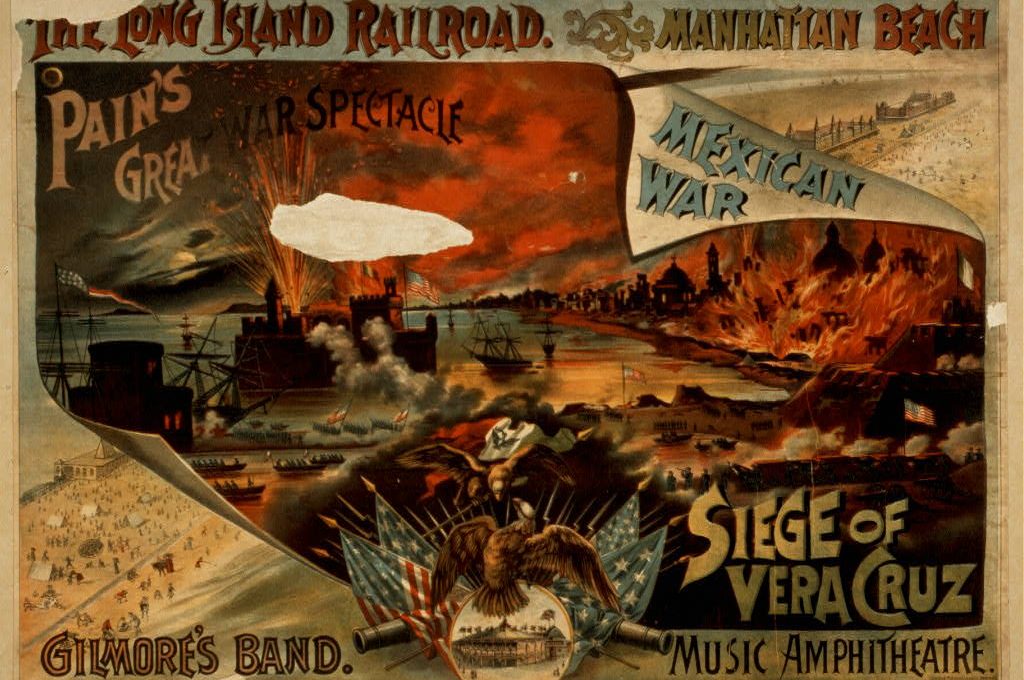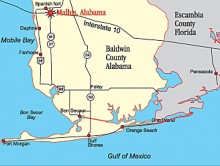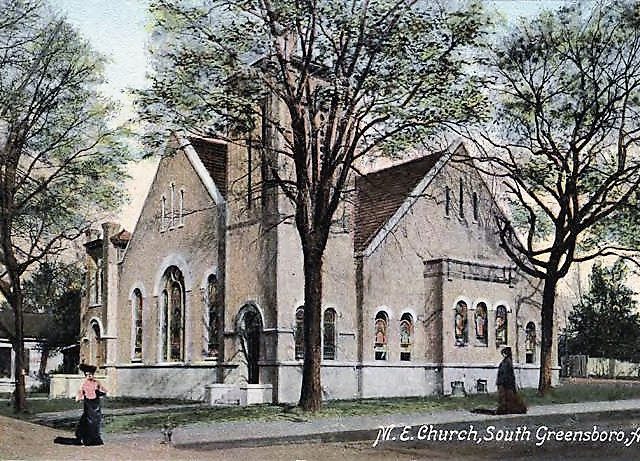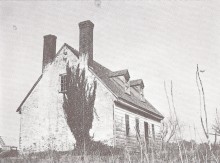MEXICAN WAR REMINISCENCES
Part II
By Judge Zo. S. Cook
(These several contributions cover the period of February to April, 1897, and were made to the Wilcox Progressive Era, published at Camden)
Article 2
In my former communication, I left the first battalion Alabama Volunteers camped at Camp Toulmin. Like all other boys and soldiers, they were full of all sorts of mischief, some innocent enough, some not commendable.
There lived about a mile from camp, not far from the powder magazine, a well-to-do and respectable Creole family, consisting of an old man, his wife, and several daughters. The daughters, as was characteristic of the race, were dark brunettes, were very pretty, refined, and well educated. The family held themselves as far above the negro race as the whitest of Caucasions. In fact, they were the owners of slaves themselves.
These may have been the descendants of the people described in this story who lived in Mobile.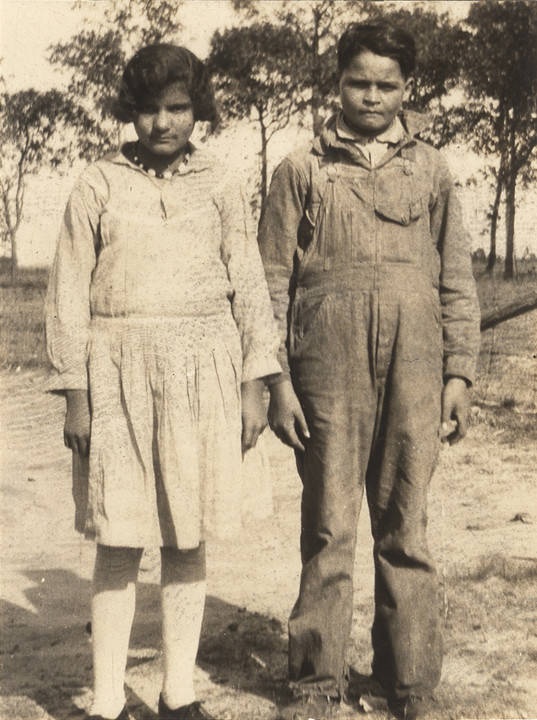
Wandered through the country
Some of the volunteers in camp, in their wanderings around through the country, came to the residence of this Creole; for excuse they went into the house and asked for a drink of water. They were politely waited on by the daughters of the old man, when their dark complexion led the soldiers to think that they were ordinary mulatto, and, so thinking, they left. They returned the next day, with others of their companions, and continued to pay visits till the old man became annoyed, as well as the whole family. They saw the mistake the soldiers had made and tried to explain that they were not what they had been taken for, all to no purpose. Finally the old man asked them politely to leave and not return again, until they could make up their minds to treat them with that respect that was due.
The soldiers still wouldn’t believe that there was any respect due the family other than that accorded to the common negro, and told the old man they intended to pay him a visit that night, when they expected to be received and accorded the fulfillment of their wishes. They filled up with whiskey, some half dozen or more, not dreaming but what all would go well, and went to the house. The old man, expecting trouble, had his doors barricaded and his gun loaded. The boys asked to be let in, and, on refusal and warning that someone would be hurt, proceeded to break down the doors of the old man’s dwelling, whereupon, being as good as his word, he fired away, killing one of them.
Protecting his family
The others saw what had happened and, in the confusion, the old man and his family fled to the city, put himself in the hands of the sheriff and asked protection. On a hearing of the facts, the old Creole was discharged. The soldier is buried near the camp and over his grave is erected a tombstone placed there by his companions. It can be seen today, standing in a garden or field, just to the right of the M. & O. R. R. after crossing the Three Mile Creek. The old Creole stayed in the city with his family till after the soldiers left. The man that was killed belonged to Capt. John Barr’s company from Tuscaloosa. The soldiers were shocked and incensed to that degree that they would have lynched the old man if they could have found him. Yet this man did nothing more than any father would have done, loved his family and looked upon it as respectable.
Whiskey prohibited
Strict orders were issued prohibiting whiskey from being brought into camp. A guard was kept around the encampment day and night, with instructions to search every man coming in, and, if whiskey was found, to send it with the disobeying soldier to headquarters. Prohibition then, as now, did not prohibit; the boys got whiskey, how or where, the officers never knew. Out in the piney woods some miles or more from camp on the Telegraph Road, a man had a little pine pole hut in which he kept whiskey and tobacco for sale. The road ran by the line of guards around the camp; a man would go out in the day, pay for a half gallon whiskey and jug.
When night would come on, this whiskey seller would pass along, having a string tied to the jug handle. One end of this cord he would throw over the line inside the camp, far enough not to attract the attention of the camp guard. Someone would be sitting at his tent door waiting; something would fall, a stick or small stone, then he would proceed to haul in the string, all the time watching for the sentinel. This sentinel had about fifty yards to walk on his post. The jug would be hauled in without attracting his attention, tatoo would beat, taps for putting out the lights, but the jug was safe. It was found that one could drink from a jug in the dark. This man would get drunk notwithstanding orders that no whiskey should be brought inside of the lines.
Young brother accompany him
One man joined Capt. Irby’s company in Mobile whether he was married or not was not known. I prefer not to give his name, He went to Capt. Irby and asked permission to let his young brother accompany him to Mexico; that he was too delicate for the hardships of a soldiers life and had no home. Capt, Irby, after thinking it over, finally consented. The little brother was brought out. He was quite a modest, retiring young man; stayed in his tent reading all the time; wouldn’t engage in any of the sports of the camp life; in fact the boys became somewhat prejudiced against the lad, by reason of his selection. Finally it began to be whispered around the camp that the little brother could be more properly called sister, that is if any relationship existed at all between the two. This report coming to the ears of Capt, Irby, he called in the aid of the surgeon of the battalion, when, on examination, the brother was found to be a sister. She was ordered to leave camp immediately; she begged to be permitted to send to town for suitable apparel, but no, she must go then. When she passed out of the lines, the boys raised a yell, followed her to the camp lines where they were stopped by order of the officer of the day. Our poor unfortunate elder brother never heard the last of the little episode. The woman was a demi monde from the city of a lower order. The soldier guilty of this breach of good morals was turned out of his mess, giving him a hard time for a long while after.
Theft in camp
While the companies were in camp at Camp Toulmin, Mr. Thrash of Dallas County, and another whose name is not remembered, started an eating house, or cook shop. Many of the boys had been raised without learning to work or knowing how to cook. For this reason, a cook-shop was suggested, which did a thriving business for awhile, at least as long as this camp lasted and money held out. The eating or cooking was good for a camp. Oysters were plentiful and cheap, vegetables in abundance.
Thrash placed his eatables, as he brought them from the city, in his hut at the head of his pallet, asserting that he did this to keep the boys from stealing his provisions. This put the boys to thinking, and to think was to act. The hut was of the ordinary shape, tightly pinned to the ground. One night after hauling in a jug, and while it became empty, the boys became more full and hungry. A happy thought occurred to some of them, when they proceeded between midnight and day to lift Thrash’s tent and abstract his oysters and a large white head cabbage. They took them to the fire of a different company, then proceeded to cook and eat to their heart’s content. No one was aroused or awake to notice what was going on. After getting through with their feasting, they left the vessels at the fire and returned to their several tents before it was day.
About this time, Thrash discovered his loss. With a rueful face and indignation depicted on every feature, he aroused Capt. Irby and the other officers, stating his complaint. Capt, Irby felt the loss keenly, because he was one of Thrash’s boarders, A great fuss was made over it, with many threats of severe punishment should the culprit be found. Thrash proceeded to inventory his losses, counting up to several dollars. He claimed to have purchased several articles that the boys knew that he did not have. About this time, the mess from another company found that the cooking had been done at their fire with their vessels; this changed the direction from our company to the one where the cooking was done, and came near causing a serious disturbance. Probably no little theft caused as much fuss ever before under the same circumstances.
At this late day, or at least during our late war, it would have been laughing matter unworthy of serious thought. Capt Irby, like the other boys, was bound in the life of a soldier; he called the company out, made an address on the duties of soldiers and their bearing as gentlemen, calling on the guilty one to come out and acknowledge it About a week after this the boys got up the amount to cover the price of the articles stolen and handed it to Thrash, but stated at the time that the names wouldn’t be given. He was glad to get even in the matter. This little incident is mentioned to show the contrast between new soldiers and old veterans. A few weeks after this, such a small matter as stealing a few oysters and head of cabbage would not have been thought anything of. In fact, it was expected that a soldier would do those little innocent things with impunity.
SOURCE
The Alabama Historical Quarterly, Vol. 19, Nos. 03 & 04, Fall and Winter Issue 1957
ALABAMA REVOLUTIONARY WAR SOLDIERS VOLUME II After the Revolutionary War, free bounty land was offered by the federal government to citizens and soldiers for their service.
This book is the 2nd Volume in a series of books which includes genealogical and biographical information on some Revolutionary Soldiers who were in early Alabama and/or collected military pensions for their service. Some of their descendants still remain on the bounty land they received. The soldiers in this volume include: JACOB HOLLAND, CHARLES M. HOLLAND, THOMAS HOLLAND, COL. JOSEPH HUGHES, CHARLES HOOKS, DIXON HALL, BOLLING HALL, WALTER JACKSON, WILLIAM HEARNE, THOMAS HAMILTON, GEN. JOHN ARCHER ELMORE, REVEREND ROBERT CUNNINGHAM, JAMES COLLIER, THOMAS BRADFORD, REUBEN BLANKENSHIP, HENRY BLANKENSHIP, DANIEL BLANKENSHIP with a special story about the patriotism of CHARLES HOOKS sister…MARY HOOKS SLOCUMB.


